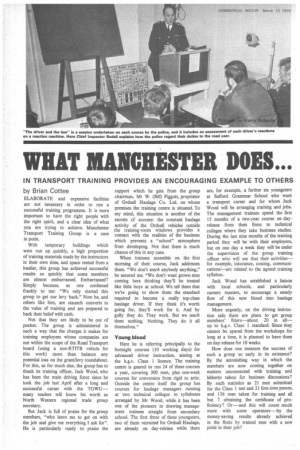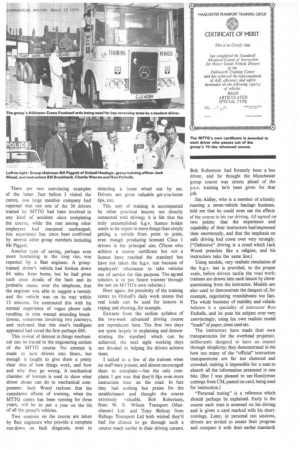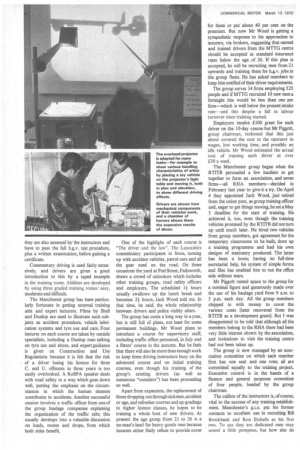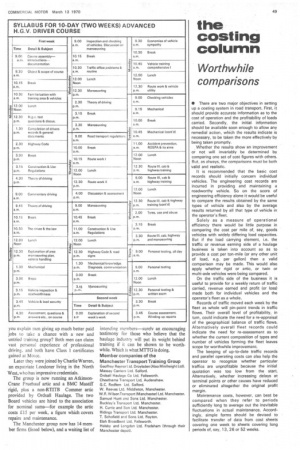WHAT MANCHESTER DOES...
Page 48

Page 49

Page 50

Page 51

If you've noticed an error in this article please click here to report it so we can fix it.
IN TRANSPORT TRAINING PROVIDES AN ENCOURAGING EXAMPLE TO OTHERS by Brian Cottee
ELABORATE and expensive facilities are not necessary in order to run a successful training programme. It is more important to have the right people with the right spirit, and a clear idea of what you are trying to achieve. Manchester Transport Training Group is a case in point.
With temporary buildings which were run up quickly, a high proportion of training materials made by the instructors in their own time, and space rented from a haulier, this group has achieved successful results so quickly that some members are almost embarrassed. Embarrassed? Simply because, as one confessed frankly to me: "We only started this group to get our levy back." Now he, and others like him, are staunch converts to the value of training and are prepared to back their belief with cash.
Not that they are likely to be out of pocket. The group is administered in such a way that the charges it makes for training employees whose companies are not within the scope of the Road Transport board (using a non-RTITE vehicle for this work) more than balance any potential loss on the grant/levy roundabout. For this, as for much else, the group has to thank its training officer, Jack Wood, who has been the main driving force since he took the job last April after a long and successful career with the TGWU— many readers will know his worth as North Western regional trade group secretary.
But Jack is full of praise for the group members, "who leave me to get on with the job and give me everything I ask for". He is particularly ready to praise the support which he gets from the group chairman, Mr W. (Bill) Piggott, proprietor of Ordsall Haulage Co. Ltd. on whose premises the training centre is situated. To my mind, this situation is another of the secrets of success: the constant haulage activity of the Ordsall vehicles outside the training-room windows provides a contact with the realities of the business which prevents a "school" atmosphere from developing. Not that there is much chance of this in any case.
When trainees assemble on the first morning of their course, Jack addresses them. "We don't teach anybody anything," he assured me. "We don't want grown men coming here thinking they'll be treated like little boys at school. We tell them that we're going to show them the standard required to become a really top-class haulage driver. If they think it's worth going for, they'll work for it. And by golly they do. They work. But we teach them nothing. Nothing. They do it all themselves."
Young blood Here he is referring principally to the fortnight courses (10 working days) for advanced driver instruction, aiming at the h.g.v. Class 1 licence. The training centre is geared to run 24 of these courses a year, covering 300 men, plus one-week courses for conversion from rigid to artic. Outside the centre itself the group has courses for haulage managers running at two technical colleges to syllabuses arranged by Mr Wood, while it has been one of the pioneers in drawing management trainees straight from secondary school. The first three of these youngsters, two of them recruited for Ordsall Haulage, are already on day-release while there are, for example, a further six youngsters at Salford Grammar School who want a transport career and for whom Jack Wood will be arranging training and jobs. The management trainees spend the first 15 months of a two-year course on dayrelease from their firms to technical colleges where they take business studies. During the last nine months of the training period they will be with their employers, but on one day a week they will he under the supervision of the group training officer who will see that their activities— for example, insurance, costing, communications—are related to the agreed training syllabus.
Jack Wood has established a liaison with local schools, and particularly careers masters, to encourage a steady flow of this new blood into haulage management.
More urgently, on the driving instruction side there are plans to get group members' fitters—about 20 in all— up to h.g.v. Class• 1 standard. Since they cannot be spared from the workshops for long at a time, it is planned to have them on day-release for 10 weeks.
How does one measure the success of such a group so early in its existence? By the astonishing way in which the members are now coming together on matters unconnected with training and hitherto taboo for business discussions? By such statistics as 21 men submitted for the Class 1 test and 21 first-time passes, and 136 men taken for training and all but 7 obtaining the certificate of proficiency? Or—and this will count much more with some operators—by the money-saving results already achieved in the fleets by trained men with a new pride in their job? There are two convincing examples of the latter. Just before I visited the centre, one large member company had reported that not one of the 36 drivers trained by MTTG had been involved in any kind of accident since completing the course, while the rate among other employees had remained unchanged; this experience has since been confirmed by several other group members including Mr Piggott.
Another type of saving, perhaps even more heartening in the long run, was reported by a fleet engineer. A grouptrained driver's vehicle had broken dawn 64 miles from home, but he had given such clear details of the fault and its probable cause, over the telephone, that the engineer was able to suggest a remedy and the vehicle was on its way within 15 minutes. He contrasted this 'with his normal experience of vague phone calls resulting in time wasted attending breakdowns, sometimes involving two journeys, and reckoned that this man's intelligent appraisal had saved the firm perhaps £60.
This revival of interest in things mechanical can be traced to the engineering section of the MTTG course. No attempt is made to turn drivers into fitters, but enough is taught to give them a pretty clear idea of how things work, and how. and why they go wrong. A mechanical chamber of horrors is used to show what driver abuse can do to mechanical components. Jack Wood reckons that the cumulative effects of training, when the MTTG centre has been running for three years, will be to put a year on the life of all the group's vehicles.
Two sessions on the course are taken by fleet engineers who provide a complete run-down on fault diagnosis, even to detecting a loose wheel nut by ear. Drivers are given valuable get-you-home tips, too.
This sort of training is accompanied by other practical lessons not directly connected with driving; it is felt that the truly accomplished h.g.v. licence holder needs to be expert in more things than simply getting a vehicle from point to point, even though producing licensed Class I drivers is the principal aim. (Those who achieve a course certificate but not a licence have reached the standard but have not taken the h.g.v. test because of employers' reluctance to take vehicles out of service for this purpose. The agreed solution is to put future trainees through the test on MTTG's own vehicles.) Here again, the proximity of the training centre to Ordsall's daily work means that real loads can be used for lessons in roping and sheeting, for example.
Extracts from the outline syllabus of the two-week advanced driving course are reproduced here. The first two days are spent largely in explaining and demonstrating the standard which can be achieved; the next eight working days are devoted to helping the drivers achieve them.
I talked to a few of the trainees when no staff were present, and almost encouraged them to complain—but the only complaint I got was that they'd like even more instruction time on the road. In fact they had nothing but praise for. the establishment and thought the course extremely valuable. Bob Robertson, from W. R. Wilson Transport (Manchester) Ltd. and Tony Bithray from Ridings Transport Ltd both wished they'd had the chance to go through such a course much earlier in their driving careers. Bob Robertson had formerly been a bus driver, and he thought the Manchester group course was streets ahead of the p.s.v. training he'd been given for that job.
Jim Aidley, who is a member of a family running a seven-vehicle haulage business, told me that he could even see the effects of the course in his car driving. All agreed on two points: that the experience and capability of their instructors had impressed then enormously, and that the emphasis on safe driving had come over very strongly. ("Defensive" driving is a creed which Jack Wood preaches like a religion, and his instructors take the same line.) Using models, very realistic simulation of the h.g.v. test is provided, to the proper scale, before drivers tackle the road work; trainees are drawn into each lesson by clever questioning from the instructor. Models are also used to demonstrate the dangers of, for example, negotiating roundabouts too fast. The whole business of stability and vehicle balance is a speciality of instructor Ron Etchells, and he puts his subject over very convincingly, using his own realistic model "loads" of paper, sheet steel etc.
The instructors have made their own transparencies for the overhead projector, deliberately designed to have an impact through simplicity; they demonstrated to me how too many of the "official" instruction transparencies are far too cluttered and crowded, making it impossible for a man to absorb all the information presented in one bite. (But I was pleased to see Handyman cuttings from CM, pasted on card, being used for instruction.) "Personal testing" is a reference which should perhaps be explained. Early in the course each man is assessed on his driving and is given a card marked with his shortcomings. Later, in personal test sessions, drivers are invited to assess their progress and compare it with their earlier standard; they are also assessed by the instructors and have to pass the full h.g.v. test procedure, plus a written examination, before gaining a certificate.
Commentary driving is used fairly extensively, and drivers are given a good introduction to this by a taped example in the training room. Abilities are developed by using three graded training routes: easy, moderate and difficult.
The Manchester group has been particularly fortunate in .getting external training aids and expert lecturers. Films by Shell and Dunlop are used to illustrate such subjects as accident procedure, vehicle lubrication systems and tyre use and care. Four lectures on each course are taken by outside specialists, including a Dunlop man talking on tyre use and abuse, and expert guidance is given on Construction and Use Regulations because it is felt that the risk of a driver losing his licence for three C. and U. offences in three years is too easily overlooked. A RoSPA speaker deals with road safety in a way which goes down well, putting the emphasis on the circumstances in which the human element contributes to accidents. Another successful session involves a traffic officer from one of the group haulage companies explaining the organization of the traffic side; this usually develops into a valuable discussion on loads, routes and drops, from which both sides benefit. One of the highlighs of each course is "The driver and the law". The Lancashire constabulary participates in force, turning up with accident vehicles, patrol cars and all the gear used on the road. On these occasions the yard at Peel Street, Failsworth, draws a crowd of onlookers which includes other training groups, road safety officers and employers. The scheduled 1+ hours usually swallows up the lunch break and becomes 21 hours, Jack Wood told me. In that time, he said, the whole relationship between drivers and police visibly alters.
The group has come a long way in a year, but is still full of plans, not least for some permanent buildings. Mr Wood plans to introduce a course for supervisory staff, including traffic office personnel, in July and a fitters' course in the autumn. But he feels that there will also be more than enough work to keep three driving instructors busy on the advanced course and on initial training courses, even though his training of the group's existing drivers (as well as numerous "outsiders") has been proceeding so well.
Apart from expansion, the replacement of those dropping out through sickness, accident or age, and refresher courses and up-gradings to higher licence classes, he hopes to be training a whole host of new drivers. At present the age group from 21 to 26 is a no-man's-land for heavy goods men because insurers either flatly refuse to provide cover for them or put about 40 per cent on the premium. But now Mr Wood is getting a sympathetic response to his approaches to insurers, via brokers, suggesting that named and trained drivers from the MTTG centre should be accepted at standard insurance rates below the age , of 26. If this plan is accepted, he will be recruiting men from 21 upwards and training them for h.g.v. jobs in the group fleets. He has asked members to keep him notified of their driver requirements.
The group serves 14 firms employing 525 people and if MTTG recruited 10 new men a fortnight this would be less than one per firm—which is well below the present intake rate—and this despite a fall in labour turnover since training started.
Employers receive £100 grant for each driver on the 10-day course but Mr Piggott, group chairman, reckoned that this just about covered the cost to the operator in wages, lost working time, and possibly an idle vehicle. Mr Wood estimated the actual cost of training each driver at over £30 a week.
The Manchester group began when the RTITB persuaded a few hauliers to get together to form an association, and seven firms—all RHA members—decided in February last year to give it a try. On April 4 they appointed Jack Wood, just retired from the union post, as group training officer and, eager to get things moving, he set a May 5 deadline for the start of training. He achieved it, too, even though the training vehicles promised by the RTITB did not turn up until much later. He hired two vehicles from group members, got agreement for the temporary classrooms to be built, drew up a training programme and had his own designs of stationery produced. The latter has been a boon; having no full-time secretarial help, his system of simple forms and files has enabled him to run the office side without tears.
Mr Piggott rented space to the group for a nominal figure and generously made over the use of his haulage yard from 9 a.m. to 5 p.m. each day. All the group members chipped in with money to cover the various costs (later recovered from the RTITB as a development grant). But I was disappointed to be told that although all the members belong to the RHA there had been very little interest shown by the association, and invitations to visit the training centre had not been taken up.
The group is now managed by an association committee on which each member firm has one seat and one vote; all are committed equally to the training project. Executive control is in the hands of a finance and general purposes committee of four people, headed by the group chairman.
The calibre of the instructors is, of course, vital to the success of any training establishment. Manchester's g.t.o. put his former contacts to excellent use in recruiting Bill Brockbank and Ron Etchells as his first two. To say they are dedicated men may sound a little pompous, but how else do
you explain men giving up much better paid jobs to take a chance with a. new and untried training group? Both men can claim vast personal experience of professional driving, and both have Class 1 certificates gained at Ivlotee.
Later they were joined by Charlie Warren, an expatriate Londoner living in the North West, who has impressive credentials.
The group is now running an AtkinsonCrane Fruehauf artic and a BMC Mastiff rigid, plus a non-RTITB Cornmer artic provided by Ordsall Haulage. The two Board vehicles are hired to the association for nominal sums-for example the artic costs £15 per week, a figure which covers repairs and maintenance.
The Manchester group now has 14 member firms (listed below), and a waiting list of
intending members-surely an encouraging testimony for those who believe that the haulage industry will put its weight behind training if it can be shown to be worthwhile. Which is what MTTG is doing. Member companies of the
Manchester Transport Training Group
Geoffrey Reyner Ltd. Droylsden (Also Minifreight Ltd).
Massey Carriers Ltd, Salford.
ordsali Haulage Co Ltd, Failsworth.
Cheethams Transport Ltd, Audenshaw.
G.C. Redfern Ltd, Salford.
W. Reeves Ltd, Middleton, Manchester.
W. R. Wilson Transport (Manchester) Ltd. Manchester.
Samuel Hunt and Sons Ltd, Manchester.
Buckley's Transport Ltd. Manchester.
H. Currie and Son Ltd. Manchester.
Ridings Transport Ltd. Manchester.
T. Schofield and Sons Ltd, Royton.
Elah Broadbent Ltd, Failsworth.
Helsby and Longdon Ltd, Frodsham (through their Manchester depot).




























































































